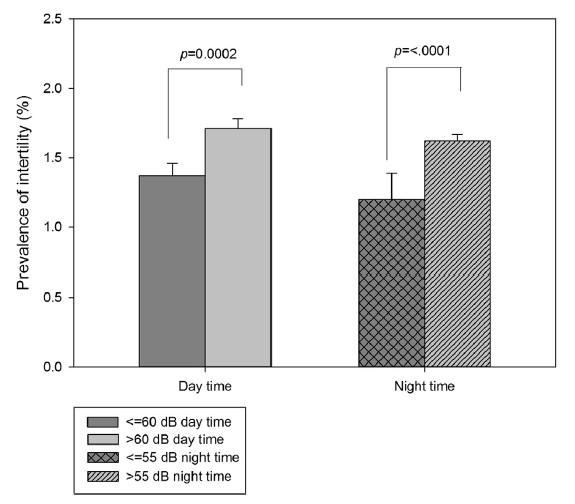
Credit: Elsevier
Oxford, UK, June 28, 2017 – Long-term exposure to a noisy environment, particularly at night, is linked to infertility in men, according to a study in Environmental Pollution. The researchers found that exposure above the WHO night noise level (55 dB – equivalent to the noise of a suburban street) is linked to a significant increase in infertility.
The scientists behind the study, from Seoul National University in the Republic of Korea, say it is important to consider noise when assessing environmental conditions that contribute to infertility.
Noise can be annoying – it breaks your concentration and disrupts your sleep. But noise has also been linked to health problems, such as heart disease and mental illness, and has been shown to change social behavior and interfere with the performance of complex tasks. Previous research focused on fertility in women has shown a link between exposure to noise and birth-related problems, such as premature birth, spontaneous abortion and congenital malformations.
The new study reveals that long-term exposure to relatively low levels of noise, particularly at night, may contribute to the development of infertility in men.
"Infertility is becoming a significant public health issue because of unexpected adverse effects on the health and quality of life and heavy expenditures on the health system," said Dr. Jin-Young Min, the study's co-author. "We know noise exposure has an effect on male fertility in animals, but our study is the first to show the risk of exposure to environmental noise on male infertility in humans."
Worldwide infertility problems affect one in six couples at least once in their lifetime, either temporarily or permanently. This may be down to a variety of causes, such as genetic abnormalities, infectious disease, environmental agents or certain behaviors. Dr. Min wanted to find out whether environmental exposure to noise, for example at work, has an impact on male infertility.
The researchers analyzed a health insurance dataset, focusing on 206,492 men aged 20-59. They calculated the levels of noise exposure using information from the National Noise Information System combined with the men's postal codes. In the eight years covered by the study (2006-2013), 3,293 had an infertility diagnosis.
After adjusting the data for variables like age, income, BMI and smoking, they found the chances of being diagnosed infertile were significantly higher in men exposed to noise over 55 dB at night (about as noisy as a suburban street or an air conditioner).
"One of the biggest problems the world is facing today is environmental pollution; my special concern is what Theo Colborn described in her book Our Stolen Future: that the rapid decline in men's sperm counts in the 20th century was due to environmental pollution," commented Dr. Min. "If this trend continues, humans in the future will not be able to have normal pregnancy and childbirth. If you are a man and suffer from infertility, you need to consider exposure to environmental pollution as a risk factor."
###
Notes for editors
The article is "Exposure to environmental noise and risk for male infertility: A population-based cohort study," by Kyoung-Bok Mina, Jin-Young Min (https://doi.org/10.1016/j.envpol.2017.03.069). It appears in Environmental Pollution, volume 226, (July, 2017), published by Elsevier.
Copies of this paper are available to credentialed journalists upon request; please contact Elsevier's newsroom at [email protected] or +31 20 485 2492.
About Environmental Pollution
Environmental Pollution is an international journal that publishes the results of novel research addressing significant environmental pollution issues and problems, and contributing new knowledge to science. The journal publishes high quality papers where the pollutants are clearly defined and measured and are directly related to biological, ecological, or human health effects. This includes air, water, and soil pollution and climate change.
About Elsevier
Elsevier is a global information analytics company that helps institutions and professionals progress science, advance healthcare and improve performance for the benefit of humanity. Elsevier provides digital solutions and tools in the areas of strategic research management, R&D performance, clinical decision support, and professional education; including ScienceDirect, Scopus, ClinicalKey and Sherpath. Elsevier publishes over 2,500 digitized journals, including The Lancet and Cell, more than 35,000 e-book titles and many iconic reference works, including Gray's Anatomy. Elsevier is part of RELX Group, a global provider of information and analytics for professionals and business customers across industries. http://www.elsevier.com
Media contact
James Palser
Elsevier
+44 0 1865 843237
[email protected]
Media Contact
James Palser
[email protected]
44-018-658-43237
@elseviernews
http://www.elsevier.com
Original Source
https://www.elsevier.com/about/press-releases/research-and-journals/male-infertility-could-be-linked-to-noisy-bedrooms,-study-suggests http://dx.doi.org/10.1016/j.envpol.2017.03.069
############
Story Source: Materials provided by Scienmag





